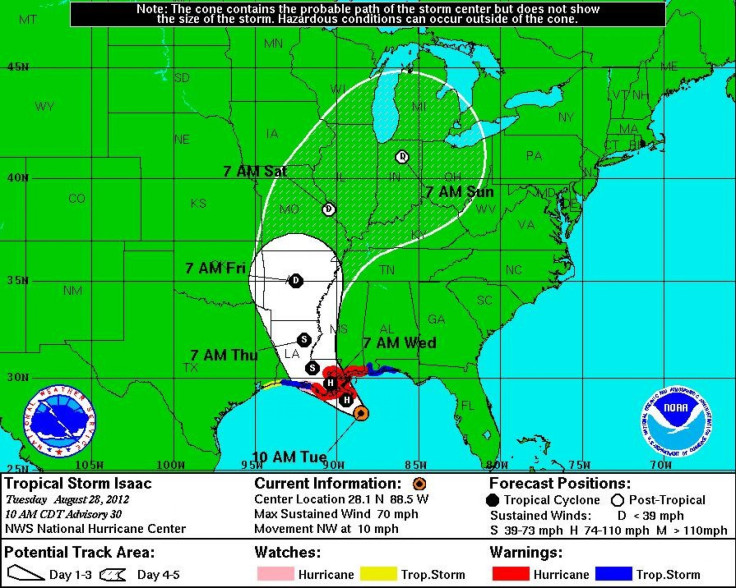Hurricane Isaac Ruining Your 2012 Summer Travel? Here’s Some Advice

Hurricane Isaac, the ninth named storm of the 2012 Atlantic hurricane season, has wreaked havoc both in the sky and out at sea over the last week as it cut a path across southern Florida toward New Orleans and the U.S. Gulf Coast, forcing over 1,300 flight cancelations and stranding thousands of cruise ship passengers.
The storm prompted airlines to scratch 857 flights Sunday and another 235 Monday in and out of South Florida, according to FlightAware. Another 297 flights to and from New Orleans International and Pensacola Regional were canceled on Tuesday.
Out at sea, meanwhile, almost a half-dozen cruise ships were kept away from land Sunday and Monday morning before the Port of Miami reopened after the storm. Several sailings due to leave from Miami and Fort Lauderdale Monday and Tuesday were thus delayed and truncated.
Traveling during hurricane season is always a gamble, but there are ways to prepare and plan accordingly.
Airplanes, Hotels and Cruise Ships
The chances of a hurricane ruining your vacation are actually lower than you may think. Not only are land-hitting severe hurricanes rare, but airlines, hotels and cruise ships all have flexible policies in place for when a storm does actually hit. So, while you may have to postpone your dream trip, it's highly unlikely it will be a complete washout.
If you don't want to be in the middle of the mess, chances are that neither does your pilot or hotel receptionist. The minute you find yourself worried about eying the storm, place a call to your airline and hotel. You'll find that those non-refundable tickets have a little more wiggle room than you'd imagined.
It's important, however, to call before the storm hits -- and don't expect a full refund. You're more likely to get a voucher that you'll need to use within a year than an actual refund. While not ideal, all things considered, it could be a lot worse.
It's also a good idea to use a credit card, opposed to a debit card, for your travel expenses. In the odd case where you encounter a problem, your credit card company can handle the dispute on your behalf.
Cruise lines deal with hurricane season differently, and they rarely cancel trips, choosing instead to re-route sailings to destinations away from oncoming storms. Lets say you booked a seven-day tour of the Eastern Caribbean. If a storm is headed that way, you may find yourself exploring the Western Caribbean instead. Or, you might get stuck with more "fun days at sea."
In the odd chance your trip is shortened, the cruise line will typically offer the choice of a prorated refund or a special package for your voyage. All told, the chances of your cruise actually being canceled are slim to none. What's more likely is a slight headache. Be sure to pack motion sickness pills because a nearby storm can churn up the sea, creating rough waters and a rocky ride.
Knowing Where and When Storms Will Hit
There's no telling when a storm may hit, but statistics offer some clues.
Some 70 percent of tropical storms occur between August and October, so those traveling in June, July and November have a lower chance of encountering a tropical tantrum. A date you may want to avoid traveling on is Sept. 10. There's been a storm churning out at sea every year for decades on that date.
Knowing where hurricanes actually hit is also essential. Florida (particularly the Keys) and the coastal regions of Texas tend to have it worst in the U.S. mainland. Louisiana and North Carolina also have it rough, statistically speaking.
If you crave warm waters with no chance of a tropical disturbance, consider traveling to Trinidad and Tobago or the ABC islands of Aruba, Bonaire and Curacao, which lie outside the hurricane belt. Further north, if you're willing to take the risk, several Caribbean destinations offer steep discounts to entice travelers during the low season. Most of the time, the gamble is worth the risk. Be aware, however, that the Bahamas has the worst record by far for hurricanes in the Caribbean.
Whatever your vacation plans are, purchasing travel insurance can put you at ease. Be careful to read the policies, though, because they vary greatly and you'll want to make sure you're covered for the kinds of issues you may encounter in your specific destination.
As Jim Grace, president and CEO of InsureMyTrip.com notes, this type of coverage is based on the occurrence of "unforeseen events."
"Once a storm has been publicly identified, it can only spell trouble for travelers without insurance protection," he says. "You need to purchase travel insurance coverage before a storm is predicted and named, not when it's bearing down on you or your intended destination."
As with everything, the key is to plan ahead. If you do, your hurricane season vacation should go off relatively smoothly, come what may.
© Copyright IBTimes 2024. All rights reserved.






















